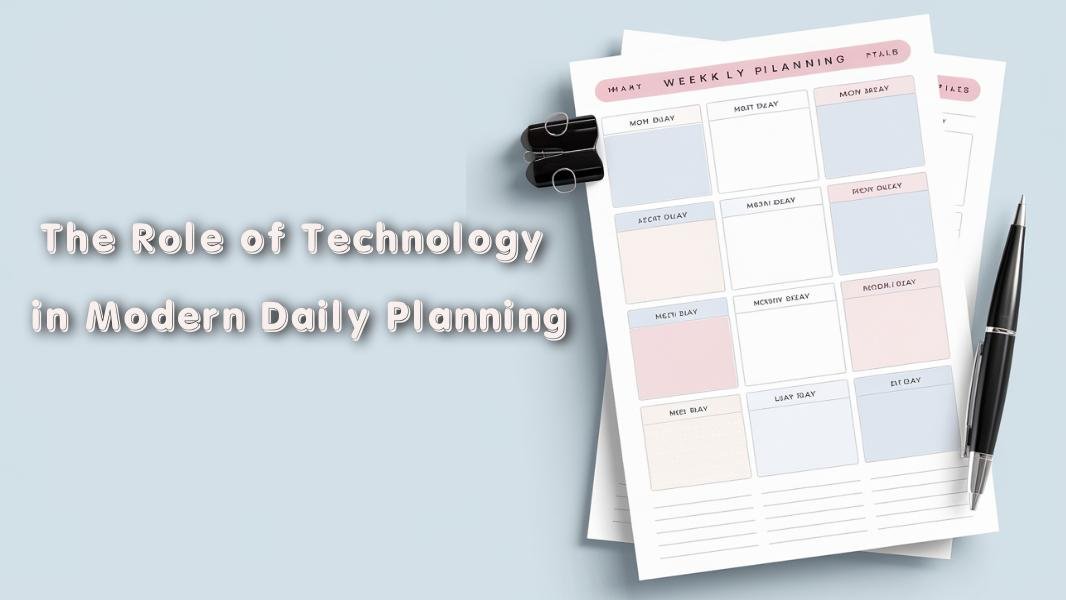In today’s fast-paced world, the way we plan our daily activities has transformed dramatically, largely due to technological advancements. Gone are the days when managing a daily schedule meant flipping through a paper planner or scribbling down tasks in a notebook. Modern technology has made it possible for us to organize, manage, and execute our daily plans with unparalleled ease and efficiency.
From setting reminders and syncing calendars to automating tasks and tracking productivity, the influence of technology in modern planning is undeniable. Whether you’re managing a complex work schedule or juggling personal responsibilities, digital planners offer a level of convenience and adaptability that paper-based systems simply can’t match.
The Rise of Digital Planning Tools
One of the most significant shifts in the world of planning is the transition from traditional paper planners to digital platforms. A digital planner offers numerous advantages over its physical counterpart. Not only can you access it from anywhere—thanks to cloud technology—but it also allows for real-time updates, automatic reminders, and seamless integration with other apps like email, calendars, and task managers.
Here are some popular digital planning tools that have redefined how people manage their time:
- PlanWiz – A highly customizable planning tool designed to streamline your daily tasks, goals, and projects. With its user-friendly interface and thousands of customizable digital planners, PlanWiz allows for seamless integration of both personal and professional plans, making it ideal for anyone who wants a comprehensive solution for time management.
- Google Calendar – This widely-used platform provides a simple way to manage events and tasks. Its ability to sync across devices and integrate with other Google services makes it a popular choice for individuals and teams alike.
- Todoist – Focused on task management, Todoist is great for breaking down projects into smaller tasks. With features like priority labeling and project categorization, it helps users stay organized and on top of their deadlines.
- Trello – Trello uses a visual board system to manage projects, tasks, and teams. It’s perfect for people who prefer a more visual approach to planning, allowing for drag-and-drop functionality and easy task delegation.
- Notion – A highly versatile tool that combines note-taking, task management, and database creation in one platform. Notion’s flexibility makes it an excellent choice for those who want to create personalized workflows for both personal and professional use.
These tools enable users to plan, organize, and track their tasks on multiple devices, ensuring they stay on top of their daily schedules, whether they are at work, home, or on the go.
Key Features of Modern Digital Planners
Today’s digital planners come with a host of features designed to enhance user experience and productivity. One of the most important features is cloud synchronization, which allows users to access their plans and to-do lists across different devices. Whether you’re using your smartphone, tablet, or laptop, a synced digital planner ensures that your daily schedule is always up to date.
Another feature is the level of customization available. Unlike traditional daily planners, which are limited by their format, digital tools let users customize layouts, add personalized labels, and even create recurring tasks. This flexibility makes it easier to tailor your planner to fit your personal or professional needs.
How Technology Enhances Productivity in Daily Planning
Technology does more than just store your to-do list; it actively works to boost productivity. Digital planners often include automation features that can handle repetitive tasks for you. For example, many tools offer automatic reminders for deadlines, helping to ensure you never miss an important task. Additionally, productivity tracking features let users see how much time they are spending on different tasks, offering insights into how to improve time management.
AI-powered assistants, such as those found in apps like Microsoft Outlook or Google Calendar, can help suggest meeting times, organize your day, and even automatically adjust your schedule based on priorities. These features make the planning process more efficient and help users focus on what matters most.
The Impact of Mobile Technology on Planning
With the rise of mobile technology, daily planning has become even more accessible. Mobile apps allow users to manage their personal daily planner on the go, which is particularly beneficial for those with busy, dynamic schedules. Push notifications can remind you of important meetings, tasks, or deadlines, ensuring you stay on track throughout the day.
Wearable technology, like smartwatches, has also revolutionized daily planning by providing instant access to reminders and task lists without needing to pull out a phone. This hands-free access makes it easier to stay organized even when multitasking.
Collaboration and Shared Planning Tools
In addition to individual planning, technology has made it easier for teams and families to collaborate on schedules. Shared digital planners enable groups to coordinate tasks, set shared deadlines, and stay aligned with mutual goals. Apps like Asana, Trello, and Google Calendar are perfect for managing group projects or family activities, ensuring everyone is on the same page.
Cloud-based collaboration features also allow multiple users to update and modify the same planner in real-time, making it a powerful tool for both personal and professional use.
Customization and Flexibility in Modern Planning Tools
Personalization is one of the key benefits of digital planners. With a digital tool, you can adjust templates, color-code tasks, and create specific categories for different aspects of your life—be it work, home, or personal development. The ability to adapt your planner to your unique needs helps you maintain a more organized and balanced life.
Additionally, many digital planners offer theme options, allowing you to change the visual appearance of your planner to match your preferences. Whether you’re a minimalist or someone who enjoys vibrant designs, there’s a planner that fits your style.
AI and Machine Learning in Daily Planning
Artificial Intelligence (AI) is increasingly becoming a staple in modern digital planning tools. AI can suggest tasks, prioritize your to-do list, and even analyze your productivity patterns. Machine learning algorithms learn from your habits and can offer insights on how to better organize your time.
For instance, tools like Todoist leverage AI to analyze your tasks and recommend the best time to complete them based on your past performance. This not only improves efficiency but also helps you tackle your most important tasks during peak productivity hours.
Digital Planning and Time Management
One of the greatest benefits of using technology in planning is the improvement in time management. Scheduling apps help users prioritize tasks, set deadlines, and create reminders, all while maintaining a clear overview of their workload. This helps to prevent procrastination and allows for better focus on tasks at hand.
By breaking down larger tasks into manageable steps, digital planners ensure that users can tackle even the most overwhelming projects with ease.
Mental Health and Digital Planning
Planning with technology can also have a positive impact on mental health. Many planning apps now include mindfulness and meditation features to help users manage stress and stay focused. Taking a mindful approach to planning ensures that you’re not overloading your schedule, giving you time to rest and recharge.
Additionally, digital tools can reduce the anxiety associated with disorganization. Knowing that all your tasks are laid out and easily accessible brings peace of mind.
Security and Privacy Concerns
As with any digital tool, security is crucial. Ensuring that your daily planner is secure should be a top priority. Always opt for apps that offer encryption and have clear privacy policies. This helps to keep sensitive information, such as appointments, passwords, and personal notes, safe from unauthorized access.
Conclusion
Technology has revolutionized how we plan and organize our daily lives. From the convenience of cloud-based planning tools to the power of AI and machine learning. Today’s daily planners offer unprecedented levels of flexibility, efficiency, and personalization. As technology continues to evolve, so too will the way we manage our personal and professional lives. Whether you prefer traditional paper planners or cutting-edge digital tools. The key is finding a balance that helps you stay productive and stress-free.




